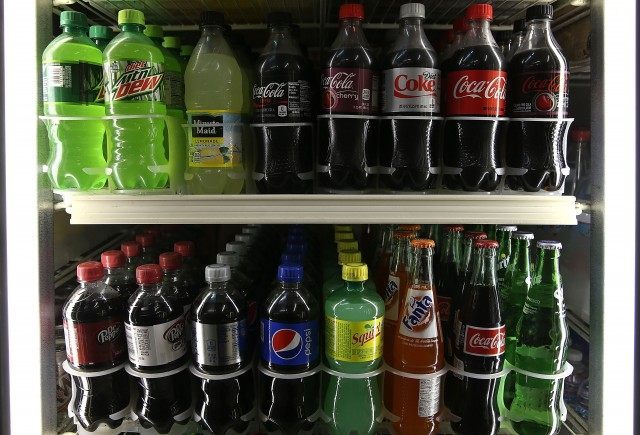British doctors are calling for a 20 percent tax to be levied on sugar in a bid to cut the obesity epidemic. But low tax campaigners have said that such a tax would “hit the poorest hardest” and have accused the doctors’ representative organisation of promoting a nanny state.
In a new report on promoting healthy diets amongst young people, the British Medical Association (BMA), the trade union of British doctors, highlighted the growing obesity epidemic in the UK and has called for action.
They have chosen to frame the problem as a battle between capitalism and the nation’s health, writing:
“Addressing the commercial influences that have such a strong impact on diet will be key. These range from the way unhealthy food and drink products are promoted and made widely available and affordable, to industry influence on the development of food and nutrition policies. Without a stronger regulatory framework, commercial interests will continue to overshadow public health interests.”
They have called for a tax on beverages of 20 per cent, but have made it clear that this is merely the first step in a broader long term goal to tax fast food out of existence. The report reads: “While taxing a wide range of products is an important long-term goal, a useful first step would be to implement a duty on sugar-sweetened beverages … by increasing the price by at least 20 per cent.”
The tax is just one measure proposed. Under the guise of doing what is in the public’s best interest, they are calling for massive intervention in the food market. “Some of the measures aim to directly protect children and young people, while others are to help parents and carers in making the right choices,” they insist.
According to The Guardian, Prof Sheila Hollins, chair of the BMA board of science has commented:
“Doctors are increasingly concerned about the impact of poor diet, which is responsible for up to 70,000 deaths a year, and has the greatest impact on the NHS budget, costing £6bn annually.
“While sugar-sweetened drinks are very high in calories they are of limited nutritional value and when people in the UK are already consuming far too much sugar, we are increasingly concerned about how they contribute towards conditions like diabetes.
“We know from experiences in other countries that taxation on unhealthy food and drinks can improve health outcomes, and the strongest evidence of effectiveness is for a tax on sugar-sweetened beverages. If a tax of at least 20% is introduced, it could reduce the prevalence of obesity in the UK by around 180,000 people.”
But Jonathan Isaby of the TaxPayers’ Alliance has hit back, pointing out that the tax measure would mostly affect poorer people who tend to eat more processed foods. He said:
“It is deeply concerning that the British Medical Association is describing what would be a regressive tax, hitting the poorest hardest, as a “useful first step”. It is clear that a Sugar Tax would signal a descent down a very slippery slope. Levies like this have been tried elsewhere, such as in Denmark, and haven’t worked.
“Rather than listen to the self-appointed High Priests of the Nanny State, the Government should let the numerous other programmes they have put in place around education and information bed in. Changes to Britain’s diets will happen via a long-term cultural shift, not by hiking the cost of living.”
The Food and Drink Federation has said that it shares the BMA’s concerns over the health of young people, who need “better, more balanced diets and lifestyles”.
However, its director general, Ian Wright added: “Many foods and drinks are already taxed at 20%. Where additional taxes have been introduced they’ve not proven effective at driving long-term, lasting change to diets.”
He welcomed comments from governmental sources ruling out a sugar tax in favour of working with industry to regulate food content.
A spokesman for the Department of Health commented:
“Tackling obesity is of great concern to this government, and we have already committed to producing a childhood obesity strategy.
“There is no silver bullet but we do want to see industry go further to cut the amount of sugar in food and drinks so that people can make healthier choices.
“We have asked for expert advice about the amount of sugar we should be eating, which will be published soon, and this will be taken into account as we continue to work on our childhood obesity strategy.”
Yet the government is likely to come under mounting pressure to ‘do something’, in much the same way as it did and continues to do so over tobacco products.
The Royal College of Physicians (RCP) has already backed the BMA’s report, with the RCP’s president Prof Jane Dacre commenting:
“Although it is the NHS that is responsible for helping individual patients with the consequences of poor diets, the way to prevent this happening in the first place is to take action across the complex pattern of our lives – our environment, our transport, our leisure activities, our shopping and eating habits, and our education. Every government department should be not just passively aware of these issues, but actively producing policies to support the reduction in obesity and health harms.”
She added: “The Royal College of Physicians agrees with the BMA that there needs to be a strong regulatory framework and concerted action across all government departments to work on the prevention of health harms arising from obesity and poor diets.”
Follow Donna Rachel Edmunds on Twitter: Follow @Donna_R_E or e-mail to: dedmunds@breitbart.com

COMMENTS
Please let us know if you're having issues with commenting.